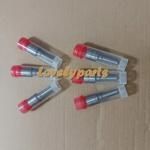Information injection-pump assembly
BOSCH
9 400 615 452
9400615452
ZEXEL
101606-1481
1016061481
MITSUBISHI
ME047493
me047493
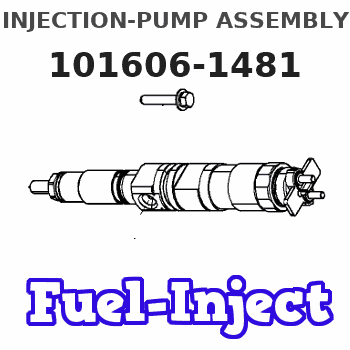
Rating:
Service parts 101606-1481 INJECTION-PUMP ASSEMBLY:
1.
_
6.
COUPLING PLATE
7.
COUPLING PLATE
8.
_
9.
_
11.
Nozzle and Holder
ME047128
12.
Open Pre:MPa(Kqf/cm2)
21.6{220}
15.
NOZZLE SET
Include in #1:
101606-1481
as INJECTION-PUMP ASSEMBLY
Cross reference number
BOSCH
9 400 615 452
9400615452
ZEXEL
101606-1481
1016061481
MITSUBISHI
ME047493
me047493
Zexel num
Bosch num
Firm num
Name
9 400 615 452
ME047493 MITSUBISHI
INJECTION-PUMP ASSEMBLY
6D16T K 14BF INJECTION PUMP ASSY PE6AD PE
6D16T K 14BF INJECTION PUMP ASSY PE6AD PE
Calibration Data:
Adjustment conditions
Test oil
1404 Test oil ISO4113 or {SAEJ967d}
1404 Test oil ISO4113 or {SAEJ967d}
Test oil temperature
degC
40
40
45
Nozzle and nozzle holder
105780-8140
Bosch type code
EF8511/9A
Nozzle
105780-0000
Bosch type code
DN12SD12T
Nozzle holder
105780-2080
Bosch type code
EF8511/9
Opening pressure
MPa
17.2
Opening pressure
kgf/cm2
175
Injection pipe
Outer diameter - inner diameter - length (mm) mm 6-2-600
Outer diameter - inner diameter - length (mm) mm 6-2-600
Overflow valve
131424-5520
Overflow valve opening pressure
kPa
255
221
289
Overflow valve opening pressure
kgf/cm2
2.6
2.25
2.95
Tester oil delivery pressure
kPa
157
157
157
Tester oil delivery pressure
kgf/cm2
1.6
1.6
1.6
Direction of rotation (viewed from drive side)
Left L
Left L
Injection timing adjustment
Direction of rotation (viewed from drive side)
Left L
Left L
Injection order
1-5-3-6-
2-4
Pre-stroke
mm
4.2
4.15
4.25
Beginning of injection position
Governor side NO.1
Governor side NO.1
Difference between angles 1
Cal 1-5 deg. 60 59.5 60.5
Cal 1-5 deg. 60 59.5 60.5
Difference between angles 2
Cal 1-3 deg. 120 119.5 120.5
Cal 1-3 deg. 120 119.5 120.5
Difference between angles 3
Cal 1-6 deg. 180 179.5 180.5
Cal 1-6 deg. 180 179.5 180.5
Difference between angles 4
Cyl.1-2 deg. 240 239.5 240.5
Cyl.1-2 deg. 240 239.5 240.5
Difference between angles 5
Cal 1-4 deg. 300 299.5 300.5
Cal 1-4 deg. 300 299.5 300.5
Injection quantity adjustment
Adjusting point
A
Rack position
9.8
Pump speed
r/min
1400
1400
1400
Average injection quantity
mm3/st.
94.8
93.8
95.8
Max. variation between cylinders
%
0
-2.5
2.5
Basic
*
Fixing the lever
*
Injection quantity adjustment_02
Adjusting point
F
Rack position
8.1+-0.5
Pump speed
r/min
340
340
340
Average injection quantity
mm3/st.
13.8
12.3
15.3
Max. variation between cylinders
%
0
-15
15
Fixing the rack
*
Timer adjustment
Pump speed
r/min
1050--
Advance angle
deg.
0
0
0
Remarks
Start
Start
Timer adjustment_02
Pump speed
r/min
1000
Advance angle
deg.
0.5
Timer adjustment_03
Pump speed
r/min
1400
Advance angle
deg.
2
1.5
2.5
Remarks
Finish
Finish
Test data Ex:
Governor adjustment
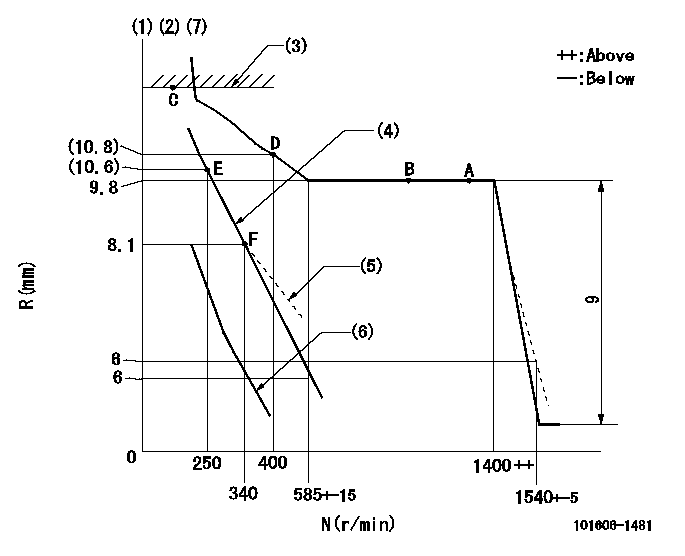
N:Pump speed
R:Rack position (mm)
(1)Lever ratio: RT
(2)Target shim dimension: TH
(3)RACK LIMIT: RAL
(4)Main spring setting
(5)Damper spring setting: DL
(6)Set idle sub-spring
(7)Microswitch adjustment unnecessary.
----------
RT=1 TH=2.7mm RAL=13.2+-0.1mm DL=8.1-0.2mm
----------
----------
RT=1 TH=2.7mm RAL=13.2+-0.1mm DL=8.1-0.2mm
----------
Speed control lever angle
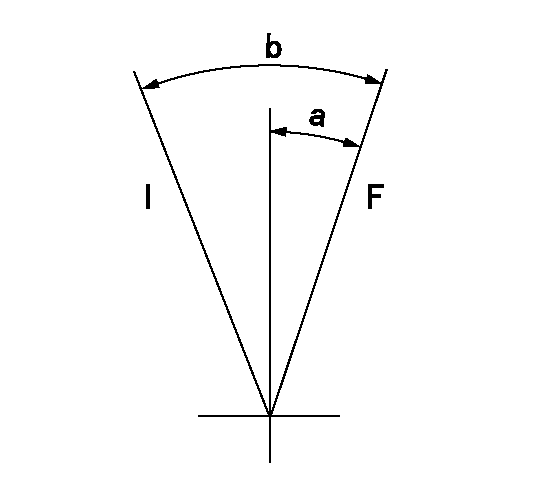
F:Full speed
I:Idle
----------
----------
a=6.5deg+-5deg b=18deg+-5deg
----------
----------
a=6.5deg+-5deg b=18deg+-5deg
0000000901
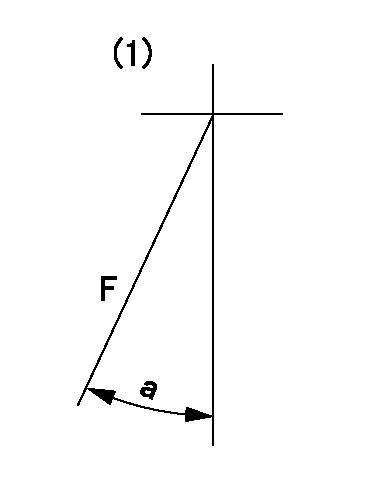
F:Full load
(1)Fix the lever at the full load position
----------
----------
a=16deg+-5deg
----------
----------
a=16deg+-5deg
Stop lever angle
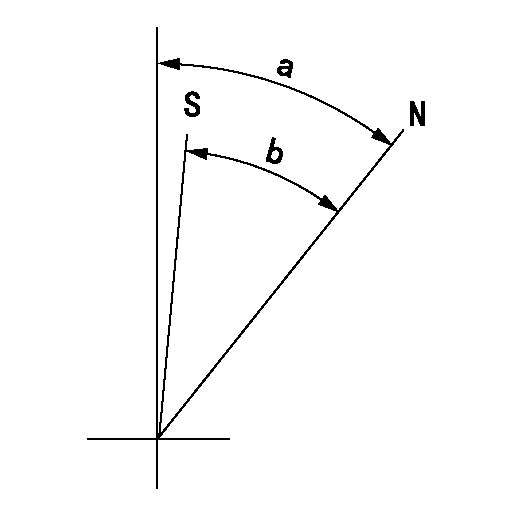
N:Pump normal
S:Stop the pump.
----------
----------
a=57deg+-5deg b=55.5deg+-5deg
----------
----------
a=57deg+-5deg b=55.5deg+-5deg
Timing setting

(1)Pump vertical direction
(2)Position of timer's tooth at No 1 cylinder's beginning of injection
(3)B.T.D.C.: aa
(4)-
----------
aa=14deg
----------
a=(1deg)
----------
aa=14deg
----------
a=(1deg)
Information:
Inspect/Replace Hoses and Clamps
Hose replacement prior to failure is a good preventive maintenance practice. Replacing a hose before it fails reduces the chances for unscheduled downtime. By replacing a hose that is cracked, soft or leaking, major repairs will be avoided that could result in a severe engine overheating problem.* Inspect all hoses for leaks due to cracking, softness and loose clamps.* Replace hoses that are cracked or soft and tighten loose clamps.Before Replacing Hoses
1. Loosen the cooling system filler cap slowly to relieve any pressure and remove the cap. 2. Drain the coolant from the cooling system to a level below the hose being replaced. Remove the hose clamps, disconnect the old hose and replace with a new hose. Install hose clamps. See the Torque for Standard Hose Clamps chart in the Torque Specifications section of this publication for the appropriate torque. After Replacing Hoses
Refer to the Cooling System Specifications section in this publication for information about cooling system requirements.3. Add proper coolant mixture to the cooling system. Fill system to the proper level. Install the filler cap. Start the engine and inspect for cooling system leaks. 4. Check coolant temperature reading frequently for proper operating temperature. Engine Air Cleaners
Never service the air cleaner with the engine running since this will allow dirt to enter the engine. Check the inlet piping for leaks. Make all repairs to inlet piping immediately, as dirt and debris could enter the engine causing damage to the turbocharger and engine components.Clean or replace elements using these recommendations and/or your weather and operating conditions, or when required by the restriction indicator.
Replace
Refer to SEBF8062, Guideline for Reusable Parts-Cleaning and Inspection of Air Filters. Regular service intervals, along with close visual inspection of the air cleaners are necessary for proper cleaning of the engine inlet air. The interval will vary with the weather and operating conditions. It will be necessary to service the air cleaners more frequently in salty, dry weather conditions or where airborne dust and debris is present. In damp weather conditions the service interval may be extended, however the elements should be replaced EVERY YEAR.Visual inspection of the gaskets and seals is important to keep dust from bypassing the cleaner elements. If the gaskets and seals or the element pleats are damaged, replace them. Extra filter elements should be kept on hand for replacement or for use while elements are being cleaned. Refer to topic Air Cleaner Indicator in the Daily maintenance for cleaning instructions. SR4 Generator
Before working inside the generator, make sure that the starting motor can not be activated by any automatic or manual signal.When servicing or repairing electric power generation equipment make sure the unit is off-line (disconnected from utility and/or other generators power service), and either locked out or tagged DO NOT OPERATE1. Remove all fuses.Make sure the generator engine is stopped.Make sure all batteries are disconnected.Make sure all capacitors are discharged.Failure to do so could result in personal injury or death.Make sure residual voltage
Hose replacement prior to failure is a good preventive maintenance practice. Replacing a hose before it fails reduces the chances for unscheduled downtime. By replacing a hose that is cracked, soft or leaking, major repairs will be avoided that could result in a severe engine overheating problem.* Inspect all hoses for leaks due to cracking, softness and loose clamps.* Replace hoses that are cracked or soft and tighten loose clamps.Before Replacing Hoses
1. Loosen the cooling system filler cap slowly to relieve any pressure and remove the cap. 2. Drain the coolant from the cooling system to a level below the hose being replaced. Remove the hose clamps, disconnect the old hose and replace with a new hose. Install hose clamps. See the Torque for Standard Hose Clamps chart in the Torque Specifications section of this publication for the appropriate torque. After Replacing Hoses
Refer to the Cooling System Specifications section in this publication for information about cooling system requirements.3. Add proper coolant mixture to the cooling system. Fill system to the proper level. Install the filler cap. Start the engine and inspect for cooling system leaks. 4. Check coolant temperature reading frequently for proper operating temperature. Engine Air Cleaners
Never service the air cleaner with the engine running since this will allow dirt to enter the engine. Check the inlet piping for leaks. Make all repairs to inlet piping immediately, as dirt and debris could enter the engine causing damage to the turbocharger and engine components.Clean or replace elements using these recommendations and/or your weather and operating conditions, or when required by the restriction indicator.
Replace
Refer to SEBF8062, Guideline for Reusable Parts-Cleaning and Inspection of Air Filters. Regular service intervals, along with close visual inspection of the air cleaners are necessary for proper cleaning of the engine inlet air. The interval will vary with the weather and operating conditions. It will be necessary to service the air cleaners more frequently in salty, dry weather conditions or where airborne dust and debris is present. In damp weather conditions the service interval may be extended, however the elements should be replaced EVERY YEAR.Visual inspection of the gaskets and seals is important to keep dust from bypassing the cleaner elements. If the gaskets and seals or the element pleats are damaged, replace them. Extra filter elements should be kept on hand for replacement or for use while elements are being cleaned. Refer to topic Air Cleaner Indicator in the Daily maintenance for cleaning instructions. SR4 Generator
Before working inside the generator, make sure that the starting motor can not be activated by any automatic or manual signal.When servicing or repairing electric power generation equipment make sure the unit is off-line (disconnected from utility and/or other generators power service), and either locked out or tagged DO NOT OPERATE1. Remove all fuses.Make sure the generator engine is stopped.Make sure all batteries are disconnected.Make sure all capacitors are discharged.Failure to do so could result in personal injury or death.Make sure residual voltage
